Quad Intel Xeon Gold 6242 Benchmarks
For this exercise, we are using our legacy Linux-Bench scripts which help us see cross-platform “least common denominator” results we have been using for years as well as several results from our updated Linux-Bench2 scripts. Starting with our 2nd Generation Intel Xeon Scalable benchmarks, we are adding a number of our workload testing features to the mix as the next evolution of our platform.
At this point, our benchmarking sessions take days to run and we are generating well over a thousand data points. We are also running workloads for software companies that want to see how their software works on the latest hardware. As a result, this is a small sample of the data we are collecting and can share publicly. Our position is always that we are happy to provide some free data but we also have services to let companies run their own workloads in our lab, such as with our DemoEval service. What we do provide is an extremely controlled environment where we know every step is exactly the same and each run is done in a real-world data center, not a test bench.
We are going to show off a few results, and highlight a number of interesting data points in this article.
Python Linux 4.4.2 Kernel Compile Benchmark
This is one of the most requested benchmarks for STH over the past few years. The task was simple, we have a standard configuration file, the Linux 4.4.2 kernel from kernel.org, and make the standard auto-generated configuration utilizing every thread in the system. We are expressing results in terms of compiles per hour to make the results easier to read:
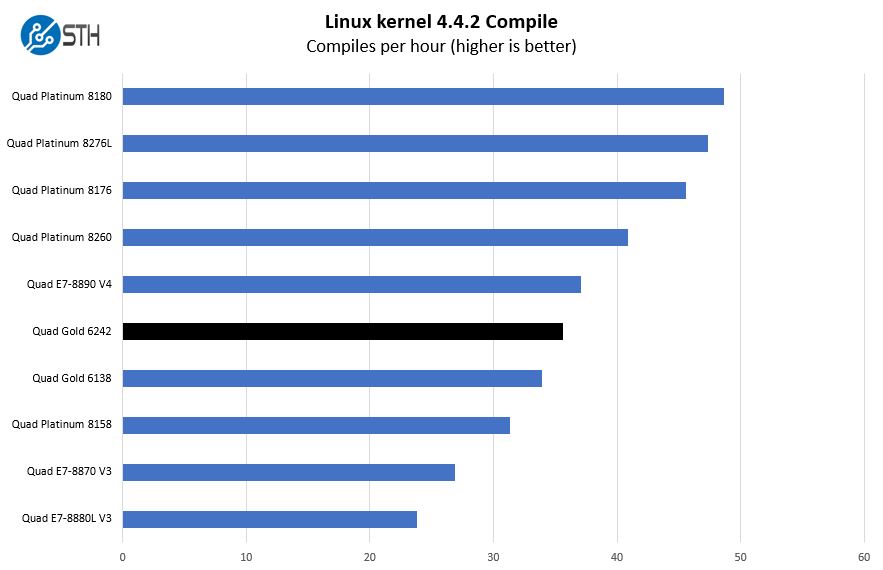
One of the interesting takeaways we have here is that the quad Intel Xeon Gold 6242 configuration performs better than the quad Intel Xeon Gold 6138 setup. This is the case even though the previous generation part has 25% more cores. For users who are constrained by per-core licensing, higher clock speeds are preferred over higher core counts.
c-ray 1.1 Performance
We have been using c-ray for our performance testing for years now. It is a ray tracing benchmark that is extremely popular to show differences in processors under multi-threaded workloads. We are going to use our 8K results which work well at this end of the performance spectrum.
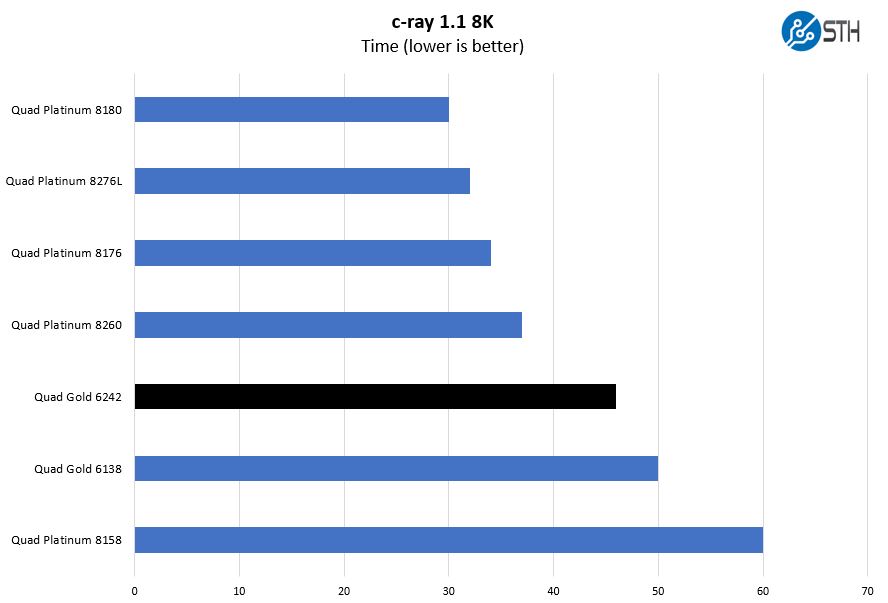
Comparing this setup to the quad Intel Xeon Platinum 8176 or quad Intel Xeon Platinum 8260 results, one can see the constraint lower core counts have on system performance. We wanted to highlight the opposite of the first chart where more cores do lead to more performance that clock speed cannot make up for.
7-zip Compression Performance
7-zip is a widely used compression/ decompression program that works cross-platform. We started using the program during our early days with Windows testing. It is now part of Linux-Bench.
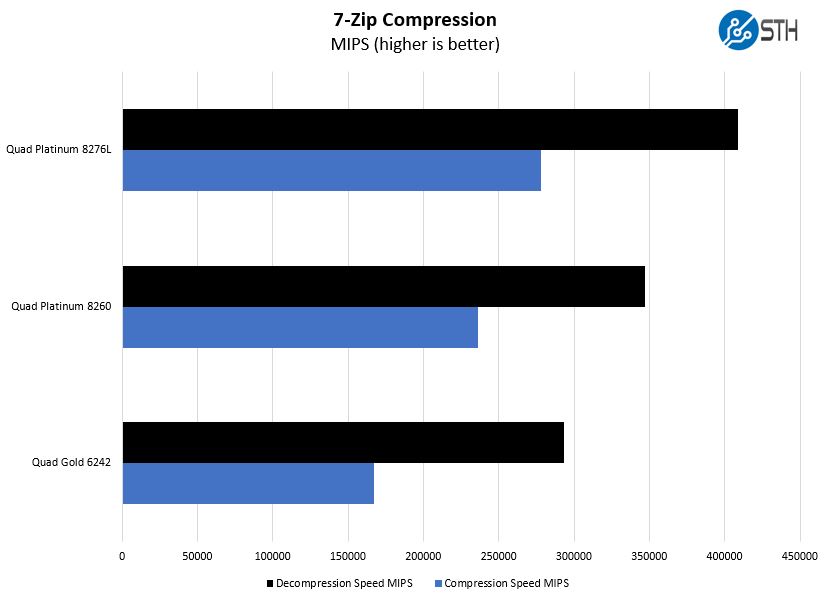
On the compression side, we wanted to pull out our results from this generation. The Intel Xeon Gold 6242 results are well below the Intel Xeon Platinum 8260 results mostly due to the core count difference. On the other hand, the Xeon Gold 6242 is a much less expensive part as one pushing into higher core counts will also pay significantly more for those cores from Intel.
NAMD Performance
NAMD is a molecular modeling benchmark developed by the Theoretical and Computational Biophysics Group in the Beckman Institute for Advanced Science and Technology at the University of Illinois at Urbana-Champaign. More information on the benchmark can be found here. With GROMACS we have been working hard to support Intel’s Skylake AVX-512 and AVX2 supporting AMD Zen architecture. Here are the comparison results for the legacy data set:
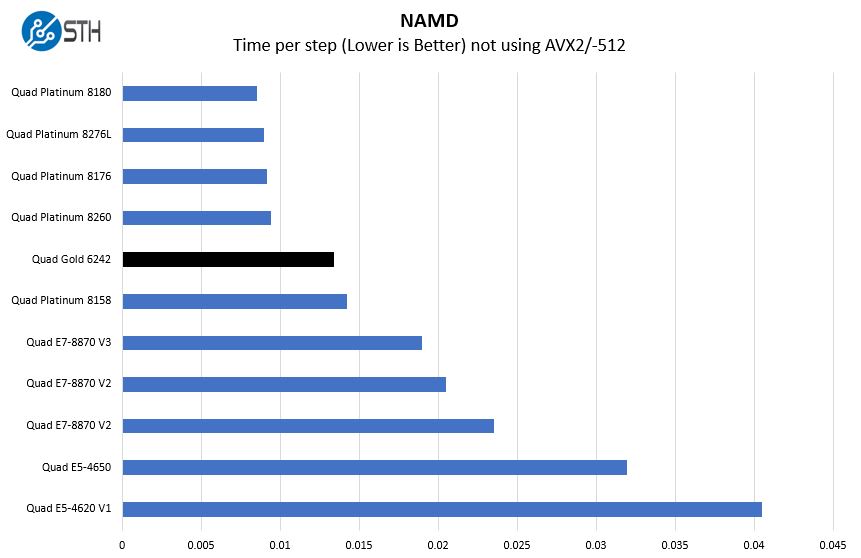
If you are comparing these chips to older generations, the quad Intel Xeon Gold 6242 performance can be spectacular.
OpenSSL Performance
OpenSSL is widely used to secure communications between servers. This is an important protocol in many server stacks. We first look at our sign tests:

Here are the verify results:
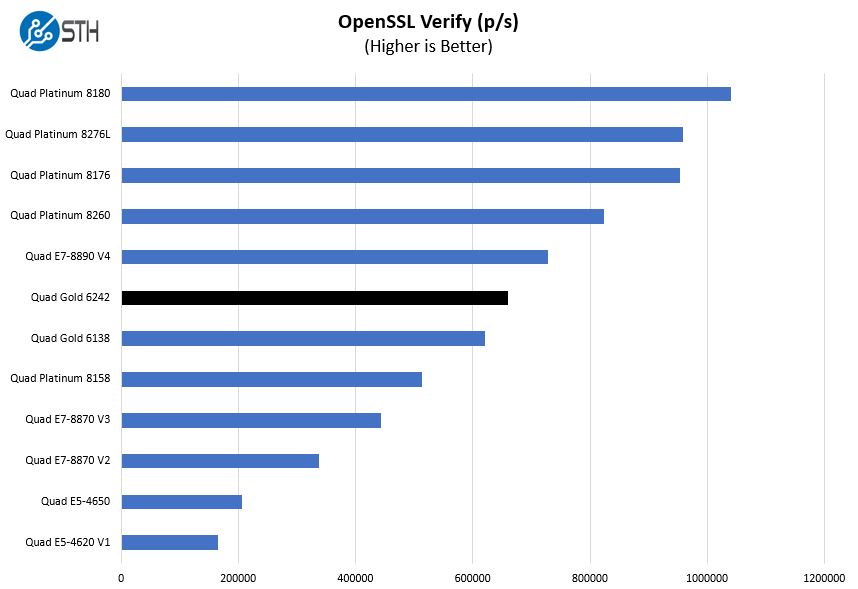
OpenSSL is a foundational technology in enterprise applications. Here we see the Intel Xeon Gold 6242 configuration fall just short of the quad Intel Xeon E7-8890 V4, a top bin SKU of its day. Two generations later, this is mid-stack performance largely driven by higher clock speeds.
UnixBench Dhrystone 2 and Whetstone Benchmarks
Some of the longest-running tests at STH are the venerable UnixBench 5.1.3 Dhrystone 2 and Whetstone results. They are certainly aging, however, we constantly get requests for them, and many angry notes when we leave them out. UnixBench is widely used so we are including it in this data set. Here are the Dhrystone 2 results:
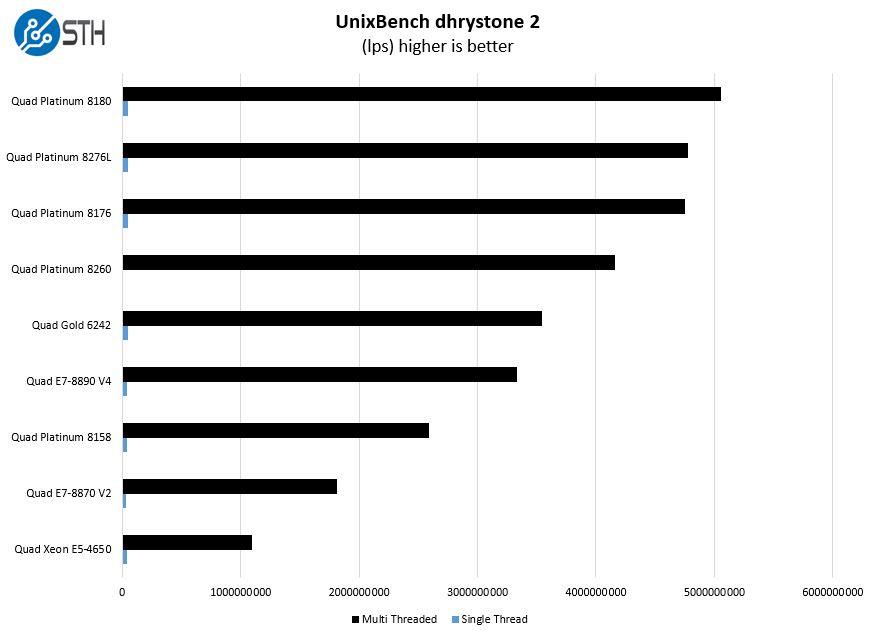
Here are the whetstone results:
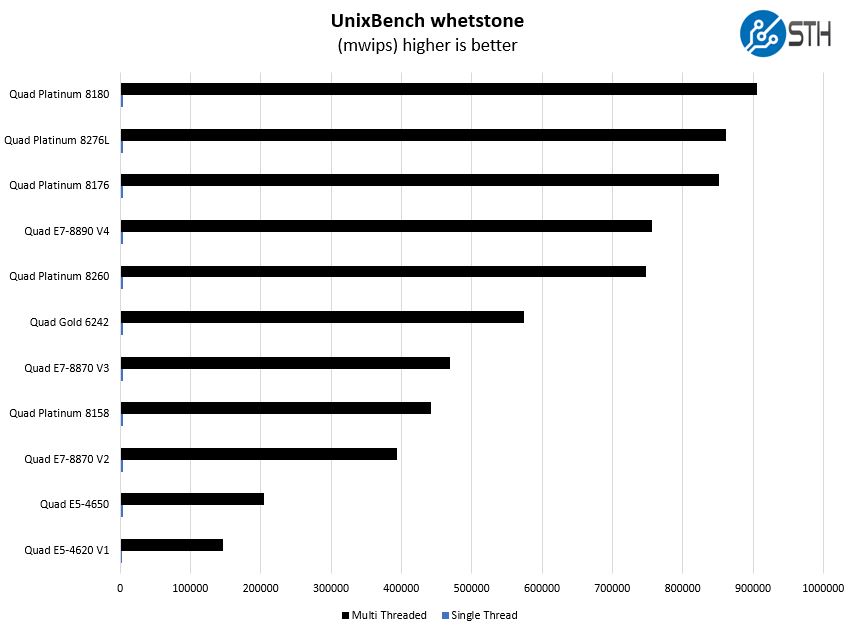
Here we see solid results. These are frankly not the best benchmarks for modern quad socket systems. Even so, the results are a bit behind the quad Xeon E7-8890 V4 setup but ahead of the quad Xeon E7-8870 V3.
GROMACS STH Small AVX2/ AVX-512 Enabled
We have a small GROMACS molecule simulation we previewed in the first AMD EPYC 7601 Linux benchmarks piece. In Linux-Bench2 we are using a “small” test for single and dual socket capable machines. Our medium test is more appropriate for higher-end dual and quad socket machines. Our GROMACS test will use the AVX-512 and AVX2 extensions if available.
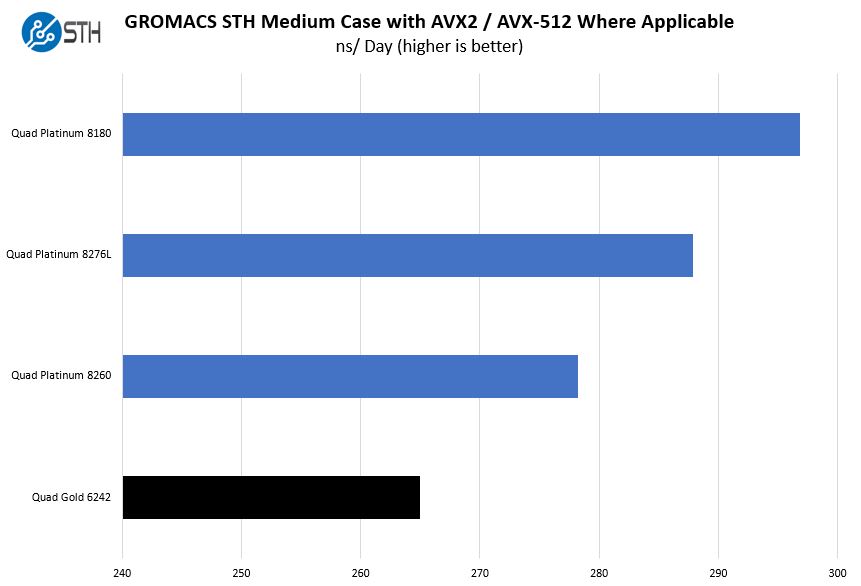
At 150W TDP, the Intel Xeon Gold 6242 is the lowest TDP part on this list and the one with the lowest core count. It is no wonder that it is also the lowest performing.
Chess Benchmarking
Chess is an interesting use case since it has almost unlimited complexity. Over the years, we have received a number of requests to bring back chess benchmarking. We have been profiling systems and are ready to start sharing results:
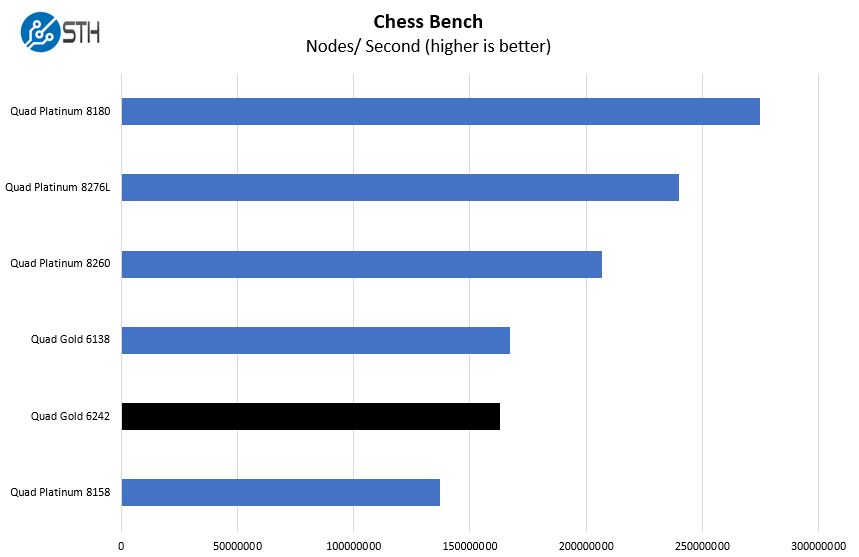
Just because the CPU is labeled “Gold” does not make it slower than Platinum parts. For example, the Intel Xeon Gold 6242 easily out-performs the quad Intel Xeon Platinum 8158 configuration.
STH STFB KVM Virtualization Testing
One of the other workloads we wanted to share is from one of our DemoEval customers. We have permission to publish the results, but the application itself being tested is closed source. This is a KVM virtualization based workload where our client is testing how many VMs it can have online at a given time while completing work under the target SLA. Each VM is a self-contained worker.
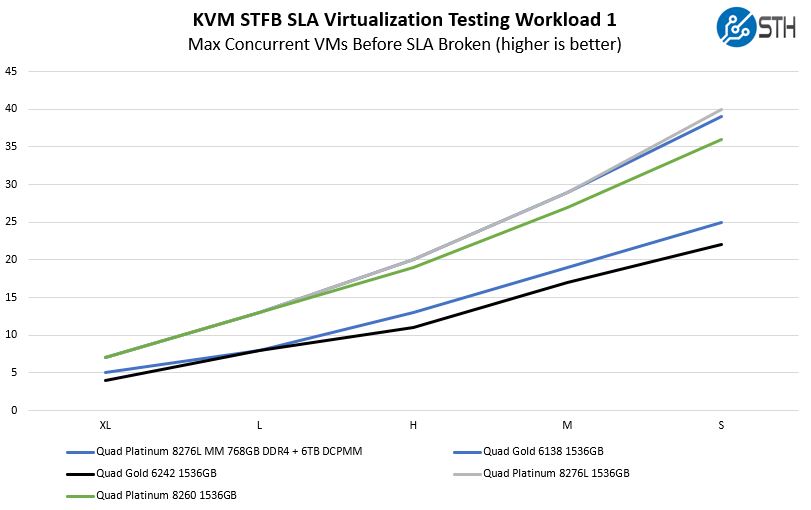
Here we can see the performance scale with core counts and clock speeds. As a result, the Intel Xeon Gold 6242 performs well, but there are better options for these virtualization workloads.
The company also has a CPU-light back-end workload that is mostly dependent on Redis performance and memory capacity with less of a CPU stressor.
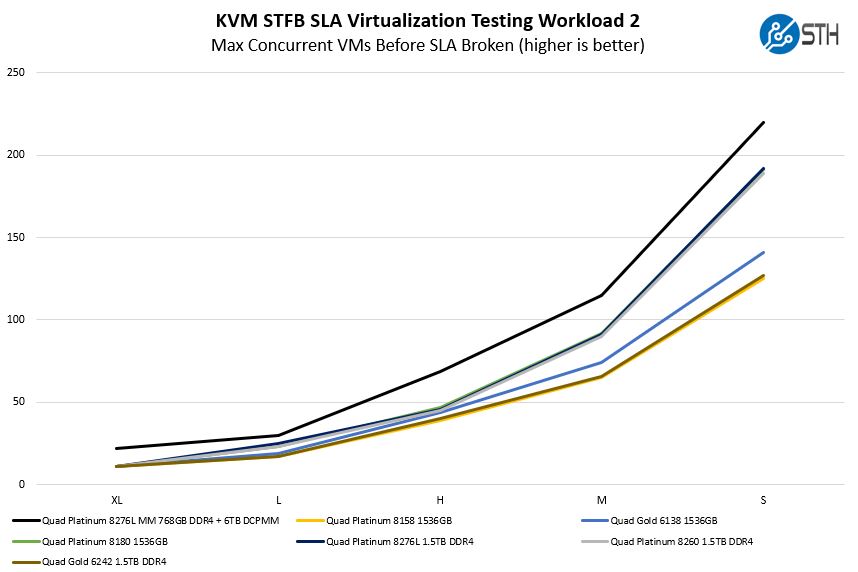
One can see that in a more memory limited test, the Intel Optane DCPMM configurations with high core counts perform better. We are also seeing the impact of higher clock speeds since at the same VM density and memory quantity, the Intel Xeon Gold 6242 configuration performs better than the Intel Xeon Platinum 8158 configuration.
Next, we are going to discuss the solution’s market positioning and then give our final thoughts.




That is going to be a nice battle between a 4x Xeon Gold 6242 system (4 NUMA cores) with 192 PCIe-3 lanes vs. the EPYC 7702p 1 socket (UMA) with 128 PCIe-4 lanes.